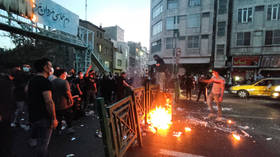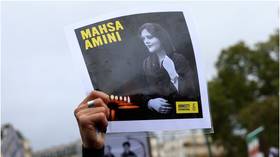UK sanctions Iranian ‘morality police’

The UK has sanctioned Iran’s Gasht-e-Ershad, the so-called ‘morality police’ responsible for enforcing Islamic dress code, accusing the force of “repression of women and girls.” London has also explained the restrictions by citing what it called Tehran’s “shocking violence” inflicted on people who turned out to protest following the death of 22-year-old Mahsa Amini in police custody.
Condemning the morality police for allegedly using threats of detention and violence to control the public behavior and dress of Iranian women, London promised on Monday to “hold [Iranian authorities] to account.”
The sanctions target the entire force, as well as its chief, Mohammed Rostami Cheshmeh Gachi, and its Tehran Division head, Haj Ahmed Mirzaei, echoing a similar move by the US several weeks ago. The British Foreign Ministry had previously summoned Iran’s charge d’affaires to complain about the police crackdown on the protests.
Amini was detained by the policing unit, the official name of which translates to ‘guidance patrols’, last month for allegedly wearing her hijab improperly. Along with other detainees, she was brought to a police station to sit through a lecture on “Islamic values” as is standard operating procedure.
Video footage from the station showed Amini collapsing while in custody, before regaining consciousness and collapsing again. She died in a hospital two days later.
While her family has claimed she was beaten, no such altercation appears on the CCTV footage from the police station. Amini died not from blunt force trauma but from a lack of oxygen to the brain due to an underlying condition, according to the coroner’s report.
Her death has nevertheless triggered widespread protests, during which scenes of women removing their hijabs and cutting their hair have dominated headlines. The demonstrations have devolved into violence in numerous cases, leaving 150 people dead, according to the group Iran Human Rights.
From initially calling for a repeal of compulsory head coverings, which have been required by law since 1983, the protesters’ demands have escalated to insisting on the removal of Supreme Leader Ayatollah Khamenei.
Tehran has blamed the US and Israel for the unrest, with its Intelligence Ministry accusing them of “direct involvement” in organizing the protests. One Iranian expat and journalist working for the US government-funded Voice of America Persia has claimed to be “leading” the protest movement, while the National Endowment for Democracy, a CIA cutout, has been heavily financing the Iranian opposition for years.













